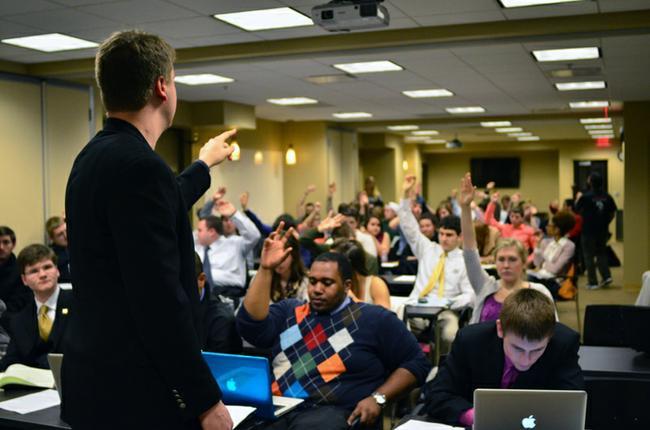The Missouri Students Association Senate has filled 14 open senate seats between the first two full senate meetings this semester, despite claims senate retention was high.
At the start of the semester, the senate had 45 senators, nine short of full capacity, but all the seats were filled at the Jan. 25 meeting.
Of those nine available senate seats, four senators were purged at the end of the fall semester, two senators resigned and three senators were promoted to the executive cabinet: Secretary of Auxillaries Lauren Damico, Chief of Staff Steven Dickherber and Director of Student Communications Zach Toombs.
An additional five open seats were filled at Wednesday’s meeting. All five of those senators resigned, citing either academic conflicts or greater time commitments from other campus organizations.
Senate Speaker Jake Sloan said it was important to note none of the last five resignations were illegitimate.
“Not one of them was purged,” he said. “They all left willingly due to extracurricular activities outside of MSA.”
Sloan said he does not have a problem with senators resigning for academic reasons.
“We’re all here as students first,” he said. “They made the right choice.”
He also said the high number of resignations is common, and he doesn’t see the high turnover as a problem for the senate.
“Usually at the beginning of every semester, there is a large volume of people who leave,” he said. “We aren’t having trouble filling the spots.”
Sloan said he received more applications than seats available.
Many of the resigning senators have come from the Student Affairs Committee. Chairman Tyler Ricketts estimated about five of his senators have resigned this semester.
He said the high turnover has not affected his committee.
“Our committee has a lot of long-serving senators,” Ricketts said.
Ricketts said these senators help new members get up to speed quickly, and he is not concerned about filling the open seats.
“Membership changes don’t affect what we do very much,” he said. “There is an eagerness among senators to fill open spots.”
Some of the senators missed two meetings before they notified Sloan of their resignations. Sloan said he contacted four senators who missed the first two meetings.
“I did make it a point to contact all of them to figure out what the issues were,” he said.
None of the senators left due to confusion, a point Sloan said was very important.
“I want to do everything I can to teach (senators),” he said. “I always maintain an ‘open-door’ policy.”
Sloan said senators sometimes leave because of confusion with parliamentary procedure within senate.
“When you’re going to something you don’t understand, you don’t feel a part of it,” he said.
Ricketts also said most of the senators from his committee who had resigned had served for two or more semesters in senate.
Sloan and other senators are working on a new section in the MSA Senate handbook that will clarify some of the more complicated parts of senate procedure. He said he hopes the additions will be more “user-friendly” with graphics and flow charts.
“Something that will catch the attention of senators and alleviate the confusion,” he said.








